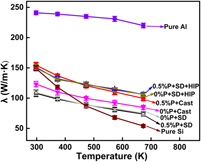Crossref Citations
This article has been cited by the following publications. This list is generated based on data provided by
Crossref.
Ma, Pan
Jia, Yandong
Prashanth, Konda Gokuidoss
Yu, Zhishui
Li, Chonggui
Zhao, Jian
Yang, Shanglei
and
Huang, Lixin
2017.
Effect of Si content on the microstructure and properties of Al–Si alloys fabricated using hot extrusion.
Journal of Materials Research,
Vol. 32,
Issue. 11,
p.
2210.
Ma, P.
Wei, Z.J.
Jia, Y.D.
Yu, Z.S.
Prashanth, K.G.
Yang, S.L.
Li, C.G.
Huang, L.X.
and
Eckert, J.
2017.
Mechanism of formation of fibrous eutectic Si and thermal conductivity of SiC p /Al-20Si composites solidified under high pressure.
Journal of Alloys and Compounds,
Vol. 709,
Issue. ,
p.
329.
Jia, Yandong
Xu, Long
Ma, Pan
Prashanth, Konda Gokuldoss
Yao, Chenghui
and
Wang, Gang
2018.
Microstructure evolution and hot deformation behavior of spray-deposited TiAl alloys.
Journal of Materials Research,
Vol. 33,
Issue. 18,
p.
2844.
Jiang, Tao
Li, Shiju
Yu, Chuang
Fu, Jinyu
Wei, Bowen
Luo, Liangliang
and
Xu, Guangming
2019.
The evolution on the microstructure and thermal expansion behavior of Al–50Si alloy with different P contents.
Journal of Materials Science: Materials in Electronics,
Vol. 30,
Issue. 7,
p.
6786.
Jiang, Tao
Fu, Jinyu
Xu, Boyue
and
Xu, Guangming
2019.
The influence on microstructure and wear behavior of hypereutectic Al-50Si alloy with various Cu-P admixture contents and cooling rates.
Surface Topography: Metrology and Properties,
Vol. 7,
Issue. 3,
p.
035008.
Dong, Tian-shun
Liu, Ming
Feng, Yang
Li, Guo-lu
and
Li, Xiao-bing
2020.
Microstructure and properties of a wear resistant Al-25Si-4Cu-1Mg coating prepared by supersonic plasma spraying.
International Journal of Minerals, Metallurgy and Materials,
Vol. 27,
Issue. 9,
p.
1287.
ERTEK, Cem
and
CİVELEK, Fatih
2020.
Comparison of functionally graded and ungraded cylinder liners with finite element analysis.
Cumhuriyet Science Journal,
Vol. 41,
Issue. 2,
p.
506.
Kojda, Danny
Hofmann, Tommy
Gostkowska-Lekner, Natalia
and
Habicht, Klaus
2022.
Characterization and modeling of the temperature-dependent thermal conductivity in sintered porous silicon-aluminum nanomaterials.
Nano Research,
Vol. 15,
Issue. 6,
p.
5663.
Ding, Chao
Hao, Huali
Ma, Rui
Ye, Changqing
Li, Shukui
Lu, Zhouguang
Yu, Changyang
Yu, Peng
Yang, Weimin
and
Ye, Shulong
2023.
Achieving high thermal conductivity of Al–50Si alloy through heat treatment and its microstructural evolution.
Journal of Materials Research and Technology,
Vol. 27,
Issue. ,
p.
4940.
Zhang, Ailing
and
Li, Yanxiang
2023.
Thermal Conductivity of Aluminum Alloys—A Review.
Materials,
Vol. 16,
Issue. 8,
p.
2972.
Li, Guo
Zhi, Geng
He, Youling
Zhang, Zhenlin
Chen, Yong
Rong, Peng
Ma, Sida
Xie, Pu
and
Chen, Hui
2024.
Study on the Forming Process and Properties of AlSi60 Alloy by Selective Laser Melting.
Coatings,
Vol. 14,
Issue. 3,
p.
259.
Shang, Xin
Li, Yongxing
Zhou, Zirong
Zhong, Chengqian
Xie, Lingzhi
Pang, Lijuan
and
Yin, Wen
2024.
Development of Al-25Si-xCe Alloy with High Conductivity and Low Expansivity for Thermal Management Purpose.
Journal of Materials Engineering and Performance,
